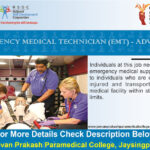Paramedical programs offer training in a wide range of specialized healthcare roles, each contributing to the efficient and compassionate delivery of medical services. From providing basic patient care to performing essential diagnostic procedures, these paramedical career paths and healthcare support roles play a vital part in the allied health field.
Certified Nursing Assistants (CNAs)
Certified Nursing Assistants (CNAs) are essential members of the healthcare team, responsible for providing direct, hands-on care to patients. They assist with daily living activities, such as bathing, dressing, and ambulation, while also monitoring vital signs and reporting changes in a patient’s condition to nurses and other medical professionals. CNAs play a crucial role in ensuring the comfort and well-being of their patients throughout the healthcare continuum.
Medical Assistants
Medical Assistants perform a diverse range of administrative and clinical tasks within healthcare settings. They are responsible for scheduling appointments, managing medical records, and undertaking basic medical procedures like taking patient histories, measuring vital signs, and administering medications. Medical Assistants serve as vital links between patients and healthcare providers, contributing to the smooth operation of medical facilities.
Phlebotomists
Phlebotomists are specialized healthcare professionals who are responsible for the collection and processing of blood samples. They play a crucial role in diagnostic testing and patient care, ensuring the accurate and safe handling of blood specimens. Phlebotomists work closely with other members of the healthcare team to support the timely and reliable analysis of test results, which informs clinical decision-making and enhances patient outcomes.
Accreditation and Certification
Selecting an accredited paramedical program is crucial, as it ensures that the educational institution and the curriculum meet rigorous industry standards. Accreditation signifies that the program provides a quality education, prepares students for professional practice, and meets the requirements for relevant certification exams and licenses.
Importance of Accredited Programs
Accreditation is a testament to the excellence of a paramedical program, assuring students that they are receiving a comprehensive education that aligns with the highest standards in the healthcare industry. These accredited paramedical programs not only provide a solid foundation of knowledge but also equip students with the necessary skills and practical experience to excel in their chosen medical roles.
Certification Exams and Licenses
Upon completing an accredited paramedical program, students may be eligible to sit for certification exams, which can lead to professional credentials and enhanced career opportunities. These certifications and licenses demonstrate a paramedical professional’s competence and commitment to their field, ultimately benefiting both the individual and the healthcare system they serve.
Career Opportunities
Graduates of paramedical programs can explore a diverse range of career opportunities within the healthcare industry. They may find employment in various healthcare facilities, such as hospitals, clinics, nursing homes, and medical laboratories, where they can contribute their specialized skills and knowledge to provide comprehensive patient care.
Healthcare Facilities
Paramedical professionals can utilize their expertise in a variety of healthcare settings, including hospitals, where they may work in emergency departments, operating rooms, or specialized units. They can also find roles in clinics, assisting with administrative tasks, patient intake, and routine medical procedures. Additionally, paramedical professionals can seek employment in nursing homes, providing support to elderly or disabled patients and helping to maintain their overall well-being.
Specialized Roles
Beyond traditional healthcare facilities, paramedical professionals can pursue specialized roles that align with their interests and expertise. For instance, they may work in medical laboratories, performing vital tasks such as specimen collection, processing, and analysis, which are crucial for accurate diagnoses and patient care. Paramedical professionals can also find opportunities in specialized outpatient clinics, where they can contribute their skills in areas like physical therapy, occupational therapy, or respiratory care.
The versatility of paramedical careers allows individuals to tailor their professional paths to their personal goals and the evolving healthcare job opportunities within the industry, ultimately contributing to the delivery of high-quality, specialized medical support to patients in need.
Continuing Education and Professional Development
As paramedical professionals, there are abundant opportunities to further enhance your knowledge, skills, and career prospects through ongoing continuing education and professional development. Many paramedical programs offer advanced certifications or the chance to pursue higher-level degrees, such as nursing or healthcare administration, allowing you to specialize and take your career to new heights.
In addition to formal education, paramedical professionals can actively participate in workshops, seminars, and training programs to stay informed about the latest advancements in their field, acquire new competencies, and demonstrate their commitment to professional growth. This continuous learning and development are crucial for adapting to the dynamic healthcare landscape and providing the highest quality of care to your patients.
Whether you’re seeking to deepen your expertise, expand your career opportunities, or simply stay at the forefront of your profession, embracing the wealth of continuing education and professional development options can be a game-changer. By investing in your own growth, you not only enhance your value as a paramedical professional but also contribute to the ongoing evolution of the healthcare industry.
FAQs
What is a Paramedical Professional?
Paramedical professionals are essential members of the healthcare team, responsible for providing a wide range of support services and assisting healthcare providers in delivering high-quality patient care. These individuals may work in various settings, including hospitals, clinics, nursing homes, and other medical facilities.
What are the Roles and Responsibilities of Paramedical Professionals?
The roles and responsibilities of paramedical professionals can include tasks such as patient monitoring, specimen collection, medication administration, medical record management, and assisting with diagnostic procedures. Paramedical professionals play a crucial role in ensuring the smooth operation of healthcare facilities and contributing to the overall well-being of patients.
What are the Benefits of Pursuing a Paramedical Career?
Pursuing a paramedical career offers numerous advantages, including job outlook and growth potential, as well as flexible career paths. The healthcare industry is experiencing steady growth, with the demand for skilled paramedical professionals expected to continue increasing. Additionally, paramedical careers offer versatility, allowing individuals to specialize in various areas or transition between different roles within the healthcare sector.
What Types of Paramedical Programs are Available?
Paramedical programs encompass a diverse range of educational pathways, each catering to specific healthcare roles and specialties. These programs may include training for positions such as certified nursing assistants (CNAs), medical assistants, phlebotomists, and other allied health professionals.
What are the Admission Requirements for Paramedical Programs?
Admission to paramedical programs typically involves specific educational prerequisites, such as holding a high school diploma or equivalent, meeting certain grade point average (GPA) or standardized test score thresholds, and completing prerequisite coursework. Applicants may also need to undergo background checks, provide proof of immunizations, and potentially participate in interviews or submit essays as part of the application process.
What is the Structure of Paramedical Training and Coursework?
Paramedical programs combine theoretical classroom instruction with hands-on practical training to provide a comprehensive education. The classroom component covers topics such as medical terminology, anatomy, physiology, pharmacology, and patient care procedures. Additionally, paramedical programs often incorporate clinical rotations and practicums, allowing students to apply their skills in real-world healthcare settings under the supervision of experienced professionals.
What are the Specialized Paramedical Careers?
Paramedical programs offer training in a wide range of specialized healthcare roles, including Certified Nursing Assistants (CNAs), Medical Assistants, and Phlebotomists. Each of these paramedical specialties contributes to the efficient and compassionate delivery of healthcare services.
Why is Accreditation and Certification Important for Paramedical Professionals?
Selecting an accredited paramedical program is crucial, as it ensures that the educational institution and the curriculum meet rigorous industry standards. Accreditation signifies that the program provides a quality education, prepares students for professional practice, and meets the requirements for relevant certification exams and licenses. Certifications and licenses demonstrate a paramedical professional’s competence and commitment to their field, ultimately benefiting both the individual and the healthcare system they serve.
What are the Career Opportunities for Paramedical Professionals?
Graduates of paramedical programs can explore a diverse range of career opportunities within the healthcare industry, such as working in healthcare facilities like hospitals, clinics, and nursing homes, as well as pursuing specialized roles that align with their interests and expertise.
How Can Paramedical Professionals Enhance Their Career Advancement?
Paramedical professionals can further enhance their knowledge, skills, and career prospects through ongoing continuing education and professional development opportunities. This can include advanced certifications, higher-level degrees, workshops, seminars, and training programs to stay informed about the latest advancements in their field and acquire new competencies.



